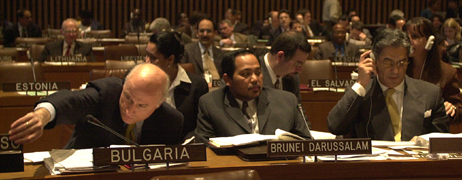 |
The
World Summit on Sustainable Development
Third Preparatory Committee (PrepCom-III) New York, 25 March - 5 April 2002 |
|
|
Working
Group I: Poverty eradication
|
 |
|
|
|
|
See more coverage of this event on the main IISD ENB website
We have launched a new website to better share our reports of global environmental negotiations.
As well as current coverage of new negotiations, you can find our original reports from this event by clicking here.
 |
The
World Summit on Sustainable Development
Third Preparatory Committee (PrepCom-III) New York, 25 March - 5 April 2002 |
|
|
Working
Group I: Poverty eradication
|
 |
|
|
|
|